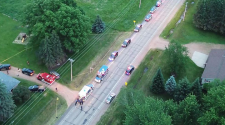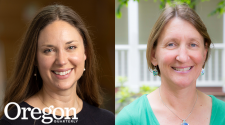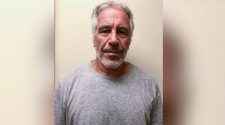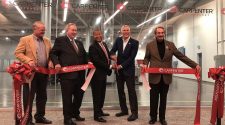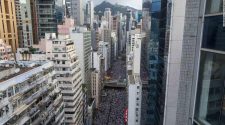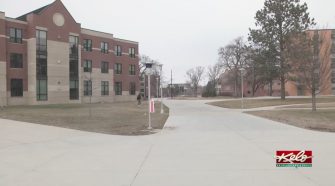A 5.4-magnitude aftershock hit southern California on Friday morning, one day after the region experienced its largest earthquake in two decades.
Thursday’s 6.4-magnitude quake landed in the small city of Ridgecrest, 100 miles (160km) from Los Angeles, and renewed fears about the potential for the “big one” to hit the west coast in the future.
Lucy Jones, one of the world’s foremost seismologists, spoke to the Guardian on Friday about the science behind the quake, why the region should expect more earthquakes in the coming years, and whether LA is really prepared for disaster. The conversation has been condensed and edited for clarity.
What has the history of earthquakes in southern California taught us, and why has it been so quiet for the past 20 years?
By studying the faults and how much they move we know approximately how many earthquakes we’ll have to have on them over 100,000 years to match with what the geology tells us. But, getting down into the human timescale, you get random subsets.
For southern California, it works out to something close to a magnitude 8 every 100 or 200 years, a magnitude 7 about every 20 to 30 years, and a magnitude 6 every three years. The bigger earthquakes are much less frequent than the smaller ones.
This is the first magnitude 6 quake in 20 years. It’s the longest interval we’ve ever had. We also saw the rates of 5s and 4s and 3s go down. Is that just random fluctuation? Potentially.
We had 20 years that was a particularly quiet time, and what we don’t know is, was that an actual change in rate and now we’re going to go back to a higher rate or was that just random clustering? Either way, we know that the last 20 years was abnormal and that’s not our long-term rate, and we should expect more earthquakes than we’ve been having recently. Chances are, we’re going to have more earthquakes in the next five years than we’ve had in the last five years.
If this kind of quake had hit LA yesterday, it could’ve been devastating. Do you feel that LA is prepared?
Better than we used to be, and not as good as we should be.
I spent 2014 at Los Angeles city hall.The seismic plan that was passed is the most comprehensive improvement in seismic safety we’ve seen. One piece is to retrofit a particularly bad type of building – called the “soft first story”, which is the same type of building that killed people in the Northridge Meadows apartment building in 1994. In the city of Los Angeles, 13,500 such buildings were identified. Over half of them are already well into the retrofit process, or have completed it . That’s a big change of people who aren’t going to die in an earthquake.
There are also some big programs involving the water system, that include significant improvements. Losing water after the earthquake is one of the biggest economic hits.
What are the most common misconceptions about earthquakes in the region?
Earthquakes really are random. People are desperate for a pattern, but you really don’t get to make one of it.
For people who view the quake as a wake-up call and want to be more prepared, what are a few simple things they could do right now?
There’s a great “seven steps to earthquake safety” at earthquakecountry.org. Make sure you have water, a family plan, and that you’ve secured the things in your house.
If you look around the world at what has happened to communities that go through bad disasters, the communities that recover are the ones where people are connected to each other. Social scientists call it a high degree of social capital, and if you think of Los Angeles, you don’t think of people really connected to their neighbors. I think that is our biggest weakness.
One of the things we’re working on is trying to develop a program to help community organizations – churches, schools, places where people connect to each other – to be better prepared for earthquakes and ready to help their members and their communities … Increase the social capital as a way of being ready for the earthquake. I think that’s the part where LA is really going to suffer.
When we think about future weather disasters in California, where do earthquakes fall on the spectrum, relative to climate change and other threats?
Globally, there’s no point in worrying about the earthquake problem if we aren’t dealing with climate change.
We’re afraid of earthquakes. They really trigger every button in us, that randomness … but the biggest disaster in California history wasn’t an earthquake, it was a flood.
There was so much rain in the winter of 1861-62that it bankrupted the state, destroyed one-third of the taxable land, and killed about 1% of the population. And most Californians don’t even know that it happened.
Those types of really big atmospheric river storms (ARkStorm) are going to get worse. We will probably increase the number of hurricanes that make it out to LA. We’re going to have more flooding problems.
As a seismologist , what was your reaction yesterday when you started feeling the quake?
I was sitting at home ready to go pick up my 99-year-old aunt for a family gathering for Fourth of July. One of the first things I did was call my aunt and say it ain’t going to happen today.Both of my adult sons called me and said, ‘So, what do you think?’ I said if you can come and cook, we’re good.
It actually took me a few seconds to be sure it was an earthquake, since the level of shaking was low. Once I was sure, I started counting and, for about 10 seconds, I felt noticeable stronger levels of shaking. So I knew it had to be over magnitude 6.
Then I got up and got to work.



